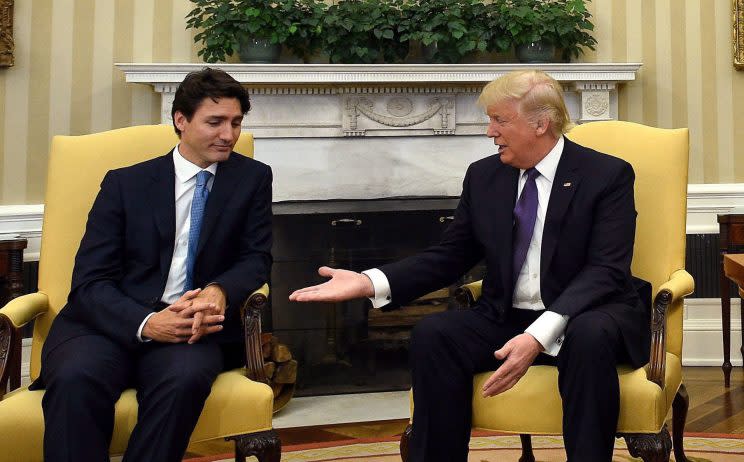Canadian executives ‘extraordinarily ambivalent’ about Trump administration: survey

Despite believing that U.S. President Donald Trump’s policies could help their businesses, Canadian executives are “extraordinarily ambivalent” about his administration.
The findings come from the C-Suite Quarterly Survey, which interviewed 156 executives from the country’s top 1,000 most profitable companies between February 27 and March 24 on behalf of KPMG.
When asked about the economic impact of the Trump presidency, the respondents seemed largely optimistic about its direction so far.
Seven out of 10 said they expect businesses to “benefit at least somewhat” from the administration’s policies.
Furthermore, most executives said they believe the Toronto Stock Exchange will be “buoyed” by a Trump effect.
A large number of them cited lower corporate taxes, deregulation, infrastructure investment and the approval of Canadian resource projects as reasons for being optimistic.
Four in 10 believed that at the very least businesses north of the border will benefit from his support from the controversial Keystone XL pipeline.
The project has received a presidential permit from the U.S. State Department after it was blocked during former U.S. President Barack Obama’s administration.
Most of the executives also believed that Canada should follow in the footsteps of its neighbours to the south if Trump makes good on his campaign promise to slash corporate taxes from 35 per cent to 15 per cent.
Canadian businesses currently enjoy a competitive advantage in this area, as the federal rate in Canada is only 15 per cent, with most provinces tacking on an additional 11 to 12 per cent.
The desire to maintain this edge may explain why executives would like Canada to drop corporate taxes on the federal level, much like the U.S.
The survey also found that both business and economic confidence are up this quarter compared to last.
However, when looking at the overall picture, the survey characterized the respondents as, at best, “cautiously optimistic” about President Trump.
“The C-Suite is extraordinarily ambivalent about the new U.S. president, despite the fact that they see so much from his Administration that is positive if not also helpful to their businesses,” said the authors in the executive summary.
Only nine per cent of those polled had a “very favourable” view of Trump and nearly half had a negative opinion.
Overall, the survey found that more executives had a positive view towards Canadian Prime Minister Justin Trudeau.
While half of the executives said Trump’s administration is “doing well” in terms of economic policy, few had confidence in its handling of trade and immigration.
The potential renegotiation of NAFTA was an area that was of particular concern, especially among executives who work in the manufacturing sector.
While most agreed that NAFTA could be improved in a way that would benefit Canada, few expected trade talks to turn out that way.
That’s why half of the respondents believe Canada should redouble its efforts to get access to Asia-Pacific markets. However, the other half believed the country should put all of its efforts in maintaining or improving current trade with the U.S.
Executives in the manufacturing sector were particularly worried about the future of NAFTA.
Those in the resource sector were concerned about the effects of a potential border adjustment tax on imports.
However, most respondents said it is very or somewhat likely that Trump’s NAFTA-related demands will only be of “minor” consequence to Canada.
Even though executives were largely optimistic about Trump’s “pro-business agenda,” roughly half expect job creation and the Canadian dollar to dip because of actions taken by the administration.
The survey also polled executives on Trump’s move to suspend refugee resettlement.
It found that the vast majority oppose the policy and it could end up being a boon for Canada in terms of attracting skilled workers.

 Yahoo Finance
Yahoo Finance 
